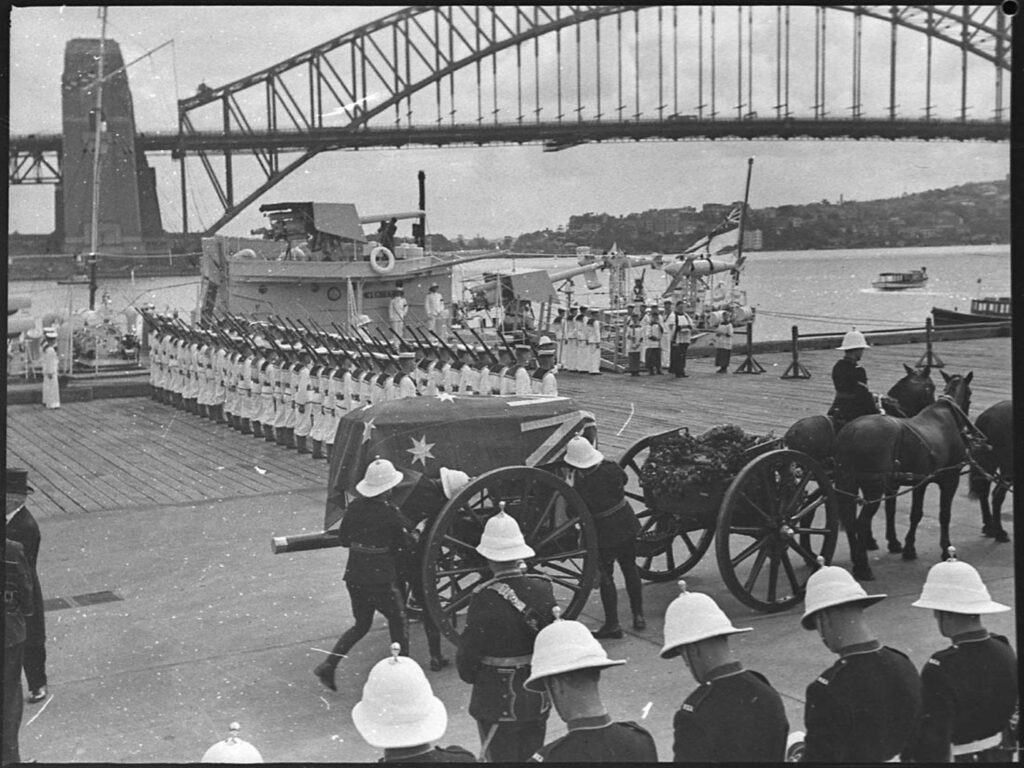On this day, 7 April 1939, Joseph Aloysius Lyons passes away in St Vincent’s Hospital, becoming the first Australian Prime Minister to die in office. In the coming weeks Robert Menzies would emerge from this tragedy to become Lyons’s successor as leader of the UAP and Australia’s twelfth Prime Minister, but for the moment the nation was in state of collective mourning.
Lyons had been travelling to Sydney to open the Royal Easter Show before a planned flight to Tasmania for a much-needed Easter break. After Lyons’s car had pulled into Goulburn to pick up his son Kevin from boarding school en route from Canberra, the Prime Minister’s health rapidly deteriorated on the drive north-east and by the time he reached Sydney he had to be rushed to hospital. There he lingered long enough for Dame Enid, his wife and the mother of their eleven children, to complete a frantic journey to be by his side for his passing on the morning of Good Friday.
Lyons’s health had been failing for a long time, with an existing heart condition aggravated by internal struggles within the UAP and the external terror of a looming world war that Lyons had sought desperately to forestall (a nightmare scenario for a pacifist who had fought against conscription during WW1). He longed to return to the quiet life in Devonport with his large Catholic family, telling a childhood friend shortly before his death ‘I should never have left Tasmania: I had real mates there, and was happy; this set-up is killing me.’ But duty and circumstance had compelled him to stay on in his post until the weight of its burden overwhelmed him.
Lyons was just two weeks short of breaking Billy Hughes’s record as Australia’s longest serving Prime Minister, but he had been notably hesitant to plan any sort of celebration for this occurrence. His government had been tremendously successful in guiding Australia out of the Great Depression via cautious and conservative economic management, and by many estimations he was Australia’s most broadly-popular PM.
Robert Menzies had been partially responsible for Lyons becoming Prime Minister, as Menzies had been a pivotal member of ‘the Group’, a handful of businessmen and backroom political dealers who had engineered Lyons’s defection from the Labor Party and ascension as head of a new non-Labor force in 1931. He had subsequently grown very attached to Lyons whose deep religious faith and humble beginnings had imbued him with a profound sense of humanism and kindness which Menzies greatly admired.
Nevertheless, Menzies had also been an aggravating factor in the internal strife of the UAP that had burdened Lyons in his final days. The previous year Menzies had given a speech to the Constitution Club in Sydney which was taken to be an attack on his leader and even prompted a Labor censure motion. He had also recently resigned from Cabinet over the watering down of a scheme of National Health and Pensions Insurance, though by all accounts Lyons did not hold this principled move against him. While Menzies’s increasing frustration at the stagnation of government policy had led to public controversy and questioning of the quality of Australian leadership, it did little to diminish the personal sentiment he had for ‘Honest Joe’.
Menzies told the Parliament on 19 April:
‘One cannot help feeling, on an occasion like this, that words are a poor medium for expressing what we all feel. One cannot help feeling that, in reality, they are unnecessary, because in this House to-day, everyone knows that there is a real community of sorrow that needs no words to express it. For myself, I should like just very briefly to mention what I believe to have been the central feature in the character and the statesmanship of the late Prime Minister. As I understand it, it was this: The problems of government were to him problems of humanity, and not problems of blue-books, or even, primarily, problems of economics, or political science. Because he understood that so clearly and so instinctively, because that great truth was in him, he brought to all his public actions, a simplicity, a sympathy, and a loving kindness which marked him out in the political history of this country. His example remains with us, and I am sure that Ave shall all carry our memories of him until our own time has come.
May I just add this one word to his widow, that great partner of his, and to his family, because this is a time when they need all the consolation that we can give them: I know of no consolation more apt and more true at this time than that which can be given by reminding them of the words of the greatest of all Consolers –
Blessed are the merciful: for they shall obtain mercy.
Blessed are the pure in heart: for they shall see God.’
Menzies had entered Federal Parliament in 1934 with an apparent agreement to eventually replace Lyons as Prime Minister, but whatever the nature of this arrangement it was never met. Instead, by resigning from Cabinet shortly before Lyons’s passing, Menzies had turned the future leadership of the UAP into an open question that would be bitterly fought out during the weeks of immediate mourning. In the meantime, Country Party Leader Earle Page was commissioned as the interim Prime Minister.
Further Reading:
Commonwealth Parliamentary Debates 19 April 1939, http://historichansard.net/hofreps/1939/19390419_reps_15_159/#debate-1
Anne Henderson, Joseph Lyons: The People’s Prime Minister (UNSW Press, 2011).
David Bird, J.A. Lyons – the ‘Tame Tasmanian’ (Australian Scholarly Publishing, 2008).
Sign up to our newsletter
Sign up for our monthly newsletter to hear the latest news and receive information about upcoming events.


